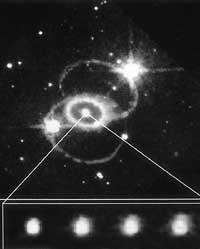Flash of missing stars
2008/12/21 Álvarez Busca, Lucía - Elhuyar Zientziaren Komunikazioa

It won’t be the most beautiful answer, but…. surely none. Why? It's not easy to explain, but it's all about distances and times.
First, we must take into account the distance of the stars from Earth. The closest star to Earth (except the Sun) is the Proxima Centauri star, located four light-years away. The farthest and the most visible can be ten thousand light years. In the first case, its light takes four years to reach us; in the second, ten thousand. Therefore, if the nearest star explodes today, we will see its light for four years before the explosion was seen.
But the life expectancy of the stars has much to do with it. We must know that massive stars (that is, the brightest and easiest to see at first sight) are the stars of the shortest life. A small star can live a hundred billion years. An average star, ten billion years. Finally, the biggest stars, the most massive, only ten million years. They have such a long life as the human!

Therefore, if we observed an exploding star, the probability of being of this latter type would be much higher. Supergiant stars visible to the naked eye, the most massive, 10, 20 and 50 times more massive than the Sun, explode as supernovae, but these explosions only occur every tens of years. At present, it is estimated that one of them does not appear to explode shortly. They will do it once, of course, but at some point it may be within ten thousand or one hundred thousand years. And, of course, no living person today will be alive within ten thousand years.
Spectacular stellar explosions
Exposed to this, it is normal for someone to think that the supernovae, the explosions of the stars, have already been seen from Earth, even at first sight. So before we saw the explosion we saw the star, it had already died. But also in that we have to be disappointed. The stars that caused these supernovae seen by the naked eye from Earth were too far away, so before the explosion they could not be seen at first sight.

What if you look with a telescope? With the help of a telescope we can see stars that are further away. The more powerful the telescope, the farther we can see it. But in the universe, when we begin to move away, we retreat into the temporal space. The farther you go, the older the stars are, as there are the first stars that were born in the universe.
In this case, we could raise the same question but compare it: How many of those stars that can be seen when we move far from Earth are still alive? And the answer would be like the previous one. Surely none. In fact, these stars were born millions of years ago and many have already reached the end of their lives.
So remember that all the stars you see when you look at the sky on a starry night, unless it is with a telescope, are alive and that within thousands of years the inhabitants of Earth will see many of those stars still alive.
Published in 7K.

Gai honi buruzko eduki gehiago
Elhuyarrek garatutako teknologia






